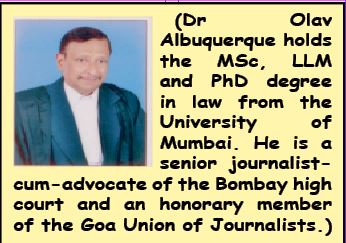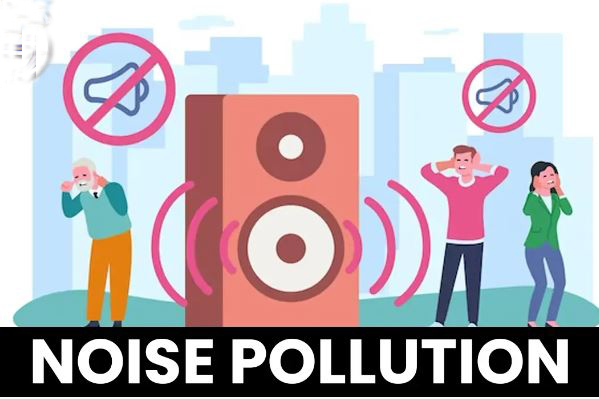By Dr Olav Albuquerque
NOISE pollution has become a menace in Goa with owners of private properties along the beaches in north Goa being forced to tolerate loud music well past the curfew of 10 pm. If at all the police act, it is after innumerable calls on the dedicated helpline provided for the purpose. There have been complaints that certain MLAs and even a particular minister makes phone calls to the police, especially at places like Morjim, to direct the lowly police constables not to take action against offenders who appear well-connected politically.
Even though those who have been driven to desperation by these blatant flouting of noise pollution control rules, have approached the high court to seek relief, the courts can do little to contain the menace, for the simple reason that the right to livelihood is contained under Article 21. Few know that the right not to be disturbed continuously by loud music played through the night is also an integral part of Article 21.
CONFLICTING RIGHTS
HENCE, this is a conundrum because two conflicting rights are contained under the umbrella of Article 21. This is known as an umbrella article because basic fundamental rights that were not envisaged by the founding fathers of our Constitution have been brought under the gamut of Article 21, such as the right to privacy, the right to education, the right to a clean environment, the right not to be handcuffed, the right to information which also falls under Article 19 (1) (a) and so on.
The high court of Bombay at Goa in its order on curbing noise pollution at the annual Sunburn festival, where drugs were also sold in the past and Shailesh Shetty, having links to a minister, was arrested under the Narcotics, Drugs & Psychotropic Substances Act, directed the state authorities to keep a vigil not only on the music festival but also on other events in Goa “so that noise pollution rules are not breached.”
Essentially, north Goa has a wide swathe of beaches where in the past the hippies organized frenzied drug parties on full moon nights where hookah were passed around containing ganja, marijuana and other banned substances. These hippies with locals joining in for a good time, held hands and danced to psychedelic tunes which reverberated along the beach at night. This could not have taken place without the Goa Police being aware of these goings-on unless there was an abysmal failure of intelligence.
The high court of Bombay at Goa also directed the total implementation of the January 7, 2021 notification regarding the declaration of Morjim beach as a silent zone. “This notification would have to be strictly enforced…because Morjim beach is a turtle nesting site,” the division bench of the high court said.
The court passed the direction after complaints of December 5, 8, and 9 of noise pollution at Gawdewada, Morjim Beach were placed on record. But leaving aside the proceedings before the high court, some locals alleged that after foreign tourists complained about the deafening noise late at night, complaints were lodged with the police.
However, in the past, a top minister phoned the police outpost and threatened them not to initiate action, following which these constables do not register an FIR or take any action. In the court, the counsel representing the Goa State Pollution Control Board (GSPCB), Pavithran A V, at the last hearing said that GSPCB officials would immediately visit the site and ensure that the sanctity of this silent zone is maintained.
Advocate general Devidas Pangam at one of the hearings clarified that as a policy, no permissions would be granted for holding the Sunburn festival after 10 pm and on December 31. Advocate Nikhil Pai representing Sunburn’s organisers, Spacebound Web Labs, told the court that the event would be held in strict adherence to the authorities’ NOC/permissions/approvals. He added that he was appearing not for a “fly-by-night operator” but rather as a permanent organizer of a prestigious event in Goa and throughout the country.
ACTION PLAN
THE government submitted an action plan to the high court to check noise levels at Sunburn. According to the plan, sub-committees comprising PSIs, circle inspectors, and pollution control board officials will continually monitor decibel levels using devices, beginning six hours prior to the event commencing at Vagator. The three-day Sunburn commenced on December 28 to 30, 2023.
The Tourism Department’s Empowered Committee- led by Tourism Minister Rohan Khaunte, further imposed restrictions on music to be played only until 10 pm on the last three days of the Sunburn festival reportedly to be held on the last three days of December. “We have given provisional approval to organise Sunburn from December 28 to 30. They should stop taking us for granted. They should not expect that we will dance to their tunes,” Khaunte was quoted as saying by IANS.
Chief Minister Pramod Sawant declared that if the locals opposed the late night parties for the festival on December 31, then they would not proceed. BJP MLA Delilah Lobo from Siolim constituency conveyed the sentiments of the locals to Chief Minister Sawant, highlighting potential disruptions to local businesses and traffic jams during midnight mass.
But 2023 has changed to 2024 without any abatement of the continuous noise which irks the locals past 10 pm.

